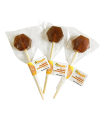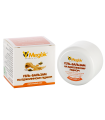Use of pollen:
Adults: 2 teaspoons/day, morning and evening (no later than 2-3 hours before bedtime).
Children: 1 teaspoon/day, in the morning.
Reception system: take in 15-20 minutes. before food, both for adults and children (with increased stomach acidity - after). Dissolve in the mouth like a lollipop. If you do not like the taste, you need to mix the pollen with honey (1:1) or eat the honey in a bite.
Course: alternation of 2 weeks of pollen use with a 1-week break.
Packaging: kraft bag, weight 100 g.
What is pollen?
Bees collect pollen from the flowers of various plants, including medicinal ones. To bring pollen to the hive, the bee glues it into balls with the help of nectar and folds it into special pockets on its hind legs. Therefore, the pollen brought by bees is called pollen and has the appearance of multi-colored lumps.
To collect pollen from bees, beekeepers install pollen collectors - special boxes with round holes - on the wings of the beehives. Trying to get into the hive through the opening of the pollen collector, the bee loses pollen, which falls into a special basket. Then the pollen is dried well in the shade and packed.
Composition and benefits
Pollen is a complex of vitamins given to humans by bees. It contains amino acids that are not produced by the human body, so he is forced to get them from the outside, that is, with food. The researchers found 27 trace elements in the pollen (sodium, potassium, nickel, titanium, vanadium, chromium, phosphorus, zircon, beryl, zinc, tin, silver, magnesium, manganese, iron, copper, etc.). Pollen also contains vitamins, pantothenic and folic acids, enzymes, hormones, bioflavonoids, and antioxidants.
Application of pollen
Increase of immunity and prevention of viral diseases. To help your body prepare for the season of viral infections, it is better to start taking pollen in the summer. Fresh pollen has been available since the end of May. It is absorbed by the body much better than pharmacy vitamin complexes and immunostimulants, does not contain sugar and dyes. When gluing pollen into lumps, bees add enzymes to it together with nectar, in particular lysozyme - an antibacterial enzyme. Good results are observed when taking pollen in a complex with royal jelly or honey.
Cardiovascular diseases. Pollen contains a large amount of vitamin P - rutin. Therefore, taking pollen contributes to reducing the fragility and permeability of capillaries, reducing blood coagulation, and increasing the elasticity of erythrocytes. Therefore, taking pollen is recommended for people suffering from diseases of the cardiovascular system. Pollen will be useful for both hypotensive and hypertensive patients. With hypotension, it will help stop dizziness and headache. With hypertension, pollen lowers blood pressure more gently than drugs. It is also used in the treatment of ischemic heart disease, cardioneurosis, microcardiodystrophy, and heart defects.
For men. Men are recommended to use pollen in case of sexual weakness (impotence), lack of sexual desire, problems with the prostate gland, excess weight. In case of problems with the prostate after taking the pollen, there was a decrease in the number of urinations at night, an improvement in the emptying of the bladder, and a gradual disappearance of discomfort in the prostate area. To achieve a lasting effect, pollen is recommended to be taken for several months. A good effect is observed when taking pollen in a complex with drone homogenate.
For children. If the child does not have allergies, taking pollen from an early age is very useful. It is not recommended to give pollen to children under 1 year old. Children aged 1-3 years can be given pollen, starting with very small doses (1/10 of the adult dose) to avoid a possible allergic reaction. Gradually, the daily dose of pollen is brought up to ¼ of the adult dose. Children from 3 years old can be given ½ the adult dose, and from 14 years old - a full daily dose of pollen. Reception of pollen is recommended for weakened children with poor appetite, who need increased nutrition, who lag behind in physical development. For children who attend kindergarten or school, taking pollen will help them better resist viral diseases, get sick less often, and better cope with school work. Children can take pollen in a complex with honey or royal jelly.
For women. Taking pollen improves the condition and color of the skin of the face, reduces the brittleness of hair and nails, and promotes their growth. It is especially useful to take pollen in the spring, when there are almost no vitamins left in vegetables and fruits.
For weight loss. During diets and starvation courses, pollen fills the deficiency of vitamins in the body, prevents the breakdown of proteins, reduces fat deposits, removes toxins from the body, helps not to lose muscle mass.
The effect of pollen on the body increases if it is taken in combination with other beekeeping products : royal jelly, drone homogenate, honey.
Contraindication:
- Individual intolerance (allergy), including seasonal allergy to plant pollen.
- Violation of blood coagulation.



